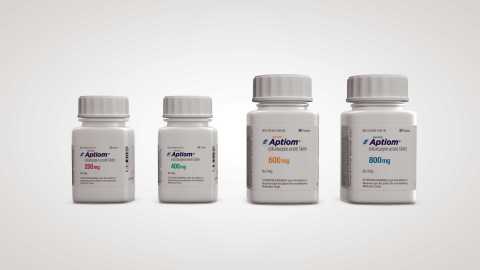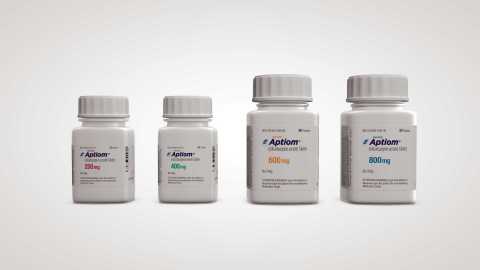MARLBOROUGH, Mass.--(BUSINESS WIRE)--Sunovion Pharmaceuticals Inc. (Sunovion) announced today that the U.S. Food and Drug Administration (FDA) approved the supplemental New Drug Application (sNDA) for Aptiom® (eslicarbazepine acetate) as monotherapy for the treatment of partial-onset seizures. This new approved indication allows APTIOM to be used as monotherapy in people who initiate treatment for the first time or convert from other antiepileptic drugs (AEDs) to APTIOM. Previously approved in 2013 by the FDA as adjunctive therapy for partial-onset seizures, APTIOM is the only exclusively once-daily non-extended release AED, which can be used alone or in combination with other AEDs in the treatment of partial-onset seizures.
“We are pleased to have achieved FDA approval of a monotherapy indication for APTIOM, based on the results of two identically designed Phase 3 clinical studies conducted by Sunovion. Data from the monotherapy trials, in addition to the data generated from the adjunctive trials, confirm that APTIOM is efficacious and well-tolerated as adjunctive or monotherapy treatment within a daily dose range of 800 to 1,600 milligrams. Prescribers now have greater flexibility to optimize clinical response and tolerability when using APTIOM to treat people with partial-onset seizures,” said Antony Loebel, M.D., Executive Vice President and Chief Medical Officer, Sunovion Pharmaceuticals Inc., and Head of Global Clinical Development for Sumitomo Dainippon Pharma Group.
The approval of APTIOM as monotherapy for partial-onset seizures was supported by data from two pivotal Phase 3 clinical trials (Studies 093-045 and 093-046). Both trials met the pre-specified primary endpoint agreed upon with the FDA.
“Sunovion has an ongoing commitment to people living with epilepsy. This approval reinforces our track record of bringing CNS therapies to market,” said David Frawley, Senior Vice President and Chief Commercial Officer, Sunovion. “We believe that APTIOM provides an additional therapeutic option to a larger group of people with partial-onset seizures, since APTIOM can now be used both as a monotherapy, as well as an adjunctive treatment.”
“Epilepsy is a common medical condition. About a third of the approximately three million people in the U.S. who have epilepsy do not have fully successful treatment with current approaches,” said John Stern, M.D., Director, Epilepsy Clinical Program and Professor, UCLA Department of Neurology. “The approval of APTIOM as a monotherapy for partial-onset seizures is based on clinical studies that provide valuable information regarding the treatment of people with epilepsy."
Patients seeking medical information, financial support and other information can access Sunovion Answers at http://www.aptiom.com/sunovion-answers.html or by calling 1.844.4APTIOM (1.844.427.8466) Monday through Friday, from 8:00 a.m. – 8:00 p.m. EST.
About the Phase 3 Studies
Two identically designed Phase 3, dose-blinded, historical-controlled, multi-center, randomized clinical trials (Studies 093-045 and 093-046) evaluated the safety and efficacy of APTIOM (1,600 mg/day or 1,200 mg/day) as monotherapy for partial-onset seizures in patients 16 years of age or older whose seizures were not well-controlled with other antiepileptic drugs (AEDs).
The primary endpoint for both trials was the percentage of patients who exited the study due to pre-defined criteria identifying worsening seizure control, compared to historical controls from previous, similarly designed trials of epilepsy patients converting to AED monotherapy. Trial results showed that conversion to APTIOM monotherapy was associated with exit rates superior to historical controls in patients with partial-onset seizures, who were not well-controlled by one or two current AEDs.
APTIOM administered once-daily was generally well tolerated in both dose strengths. In the APTIOM monotherapy trials, the most common treatment-related adverse events, headache, dizziness, fatigue, somnolence, and nausea, were mainly mild or moderate in severity.
About Aptiom® (eslicarbazepine acetate)
APTIOM is the latest member of the dibenzazepine carboxamide family of antiepileptic drugs (AEDs), an established class of medicines. APTIOM is the only exclusively once-daily, non-extended release AED now FDA-approved for use as monotherapy or adjunctive therapy for partial-onset seizures. The precise mechanism(s) by which eslicarbazepine, the primary active metabolite of APTIOM, exerts anticonvulsant activity is unknown but is thought to involve inhibition of voltage-gated sodium channels. APTIOM can be taken whole or crushed, with or without food. APTIOM is not classified as a controlled substance by the FDA.
The initial research and development of eslicarbazepine acetate was performed by BIAL-Portela & Ca, S.A. (BIAL), a privately held Portuguese research-based pharmaceutical company. Subsequently, Sunovion acquired the rights under an exclusive license to further develop and commercialize eslicarbazepine acetate in the United States and Canadian markets from BIAL. BIAL gained approval for eslicarbazepine acetate from the European Commission on April 21, 2009 as adjunctive therapy in adult patients with partial-onset seizures with or without secondary generalization. In Europe, the product is marketed under the trade name Zebinix®. APTIOM is approved in Canada for use as adjunctive therapy in the treatment of partial-onset seizures in patients with epilepsy who are not satisfactorily controlled with conventional therapy.
About Epilepsy and Partial-Onset Seizures
Epilepsy is the fourth most common neurological condition, and one in 26 people in the U.S. will develop epilepsy in their lifetime.1 Epilepsy manifests as unprovoked seizures, which are caused by abnormal firing of impulses from nerve cells in the brain.2 Partial-onset seizures, one type of seizure and the most common, are characterized by bursts of electrical activity that are initially focused in specific areas of the brain and may become more widespread, with symptoms varying according to the affected areas.3 The unpredictable nature of seizures can have a significant impact on those with epilepsy. Reducing the frequency of seizures can greatly lessen the burden of epilepsy.2 With approximately one-third of people living with epilepsy still unable to control seizures, there continues to be a need for new therapies.4 Up to 40 percent of people living with epilepsy do not respond to the first or second monotherapy5, and approximately 36 percent do not have adequate control of seizures despite the use of two or more antiepileptic medications6.
Please see Important Safety Information below.
INDICATION:
Aptiom® (eslicarbazepine acetate) is a prescription medicine used alone or with other medicines to treat partial-onset seizures.
IMPORTANT SAFETY INFORMATION:
Do not take APTIOM if you are allergic to eslicarbazepine acetate, any of the other ingredients in APTIOM, or oxcarbazepine.
Suicidal behavior and ideation: APTIOM may cause suicidal thoughts or actions, depression, or mood problems. Call your doctor right away if you experience these or any other effects or reactions: thoughts about suicide or dying; attempting to commit suicide; new or worse depression, anxiety, or irritability; feeling agitated or restless; panic attacks; trouble sleeping (insomnia); acting aggressive; being angry or violent; acting on dangerous impulses; an extreme increase in activity and talking (mania); or other unusual changes in behavior or mood.
Allergic reactions: APTIOM may cause serious skin rash or other serious allergic reactions that may affect organs or other parts of your body like the liver or blood cells. You may or may not have a rash with these types of reactions. Call your doctor right away if you experience any of the following symptoms: swelling of the face, eyes, lips, or tongue; trouble swallowing or breathing; hives; fever, swollen glands, or sore throat that do not go away or come and go; painful sores in the mouth or around your eyes; yellowing of the skin or eyes; unusual bruising or bleeding; severe fatigue or weakness; severe muscle pain; or frequent infections or infections that do not go away.
Low salt (sodium) levels in the blood: APTIOM may cause the level of sodium in your blood to be low. Symptoms may include nausea, tiredness, lack of energy, irritability, confusion, muscle weakness or muscle spasms, or more frequent or more severe seizures.
Nervous system problems: APTIOM may cause problems that can affect your nervous system, including dizziness, sleepiness, vision problems, trouble concentrating, and difficulties with coordination and balance. APTIOM may slow your thinking or motor skills. Do not drive or operate heavy machinery until you know how APTIOM affects you.
Liver problems: APTIOM may cause problems that can affect your liver. Symptoms of liver problems include yellowing of your skin or the whites of your eyes, nausea or vomiting, loss of appetite, stomach pain, or dark urine.
Most common adverse reactions: The most common side effects in patients taking APTIOM include dizziness, sleepiness, nausea, headache, double vision, vomiting, feeling tired, problems with coordination, blurred vision, and shakiness.
Drug interactions: Tell your healthcare provider about all the medicines you take, including prescription and over-the-counter medicines, vitamins, and herbal supplements. Taking APTIOM with certain other medicines may cause side effects or affect how well they work. Do not start or stop other medicines without talking to your healthcare provider. Especially tell your healthcare provider if you take oxcarbazepine, carbamazepine, phenobarbital, phenytoin, primidone, clobazam, omeprazole, simvastatin, rosuvastatin, or birth control medicine.
Discontinuation: Do not stop taking APTIOM without first talking to your healthcare provider. Stopping APTIOM suddenly can cause serious problems.
Pregnancy and lactation: APTIOM may cause your birth control medicine to be less effective. Talk to your healthcare provider about the best birth control method to use. APTIOM may harm your unborn baby. APTIOM passes into breast milk. Tell your healthcare provider if you are pregnant or plan to become pregnant, or are breastfeeding or plan to breastfeed. You and your healthcare provider will decide if you should take APTIOM. If you become pregnant while taking APTIOM, talk to your healthcare provider about registering with the North American Antiepileptic Drug (NAAED) Pregnancy Registry. The purpose of this registry is to collect information about the safety of antiepileptic medicine during pregnancy. You can enroll in this registry by calling 1-888-233-2334.
Get medical help right away if you have any of the symptoms listed above.
You are encouraged to report negative side effects of prescription drugs to the FDA. Visit www.fda.gov/medwatch or call 1-800-FDA-1088.
For more information, please see the APTIOM Medication Guide and Full Prescribing Information at www.APTIOM.com.
About Sunovion Pharmaceuticals Inc. (Sunovion)
Sunovion is a leading pharmaceutical company dedicated to discovering, developing and commercializing therapeutic products that advance the science of medicine in the Psychiatry, Neurology and Respiratory disease areas to improve the lives of patients and their families.
Sunovion, an indirect, wholly owned subsidiary of Sumitomo Dainippon Pharma Co., Ltd., is headquartered in Marlborough, Mass. More information about Sunovion Pharmaceuticals Inc. is available at www.sunovion.com.
About Sumitomo Dainippon Pharma Co., Ltd.
Sumitomo Dainippon Pharma is a top-ten listed pharmaceutical company in Japan. Sumitomo Dainippon Pharma aims to produce innovative pharmaceutical products in the Psychiatry & Neurology area and the Oncology area, which have been designated as the focus therapeutic areas. Sumitomo Dainippon Pharma is based on the merger in 2005 between Dainippon Pharmaceutical Co., Ltd., and Sumitomo Pharmaceuticals Co., Ltd. Today, Sumitomo Dainippon Pharma has about 7,000 employees worldwide. Additional information about Sumitomo Dainippon Pharma is available through its corporate website at www.ds-pharma.com
APTIOM is used under license from BIAL.
Sunovion Pharmaceuticals Inc. is a U.S. subsidiary of Sumitomo Dainippon Pharma Co., Ltd.
© 2015 Sunovion Pharmaceuticals Inc.
For a copy of this release, visit Sunovion’s web site at www.sunovion.com
References
1 Institute of Medicine (IOM). 2012. “Epilepsy across the spectrum: Promoting health and understanding.” Washington, DC: The National Academies Press.
2 National Institutes of Health. “NINDS Epilepsy Information Page” Accessed July 2015. <http://www.ninds.nih.gov/disorders/epilepsy/epilepsy.htm>
3 Epilepsy Foundation. “Complex Partial Seizures.” Accessed July 2015. <http://www.epilepsy.com/learn/types-seizures/complex-partial-seizures>.
4 Brodie MJ, Barry SJE, Bamagous GA, Norrie JD, Kwan P. Patterns of treatment response in newly diagnosed epilepsy. Neurology. 2012;78:1548-1554.
5 Kwan P, Brodie MJ. “Early Identification of Refractory Epilepsy.” New England Journal of Medicine (2000): 342(5):314-9. http://www.ncbi.nlm.nih.gov/pubmed/10660394.
6 Epilepsy Foundation. “Epilepsy Foundation Position Statement” <http://www.epilepsycolorado.org/index.php?s=12105>. Accessed June 2015.




